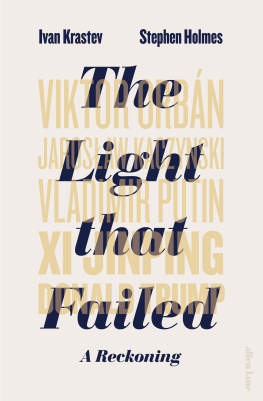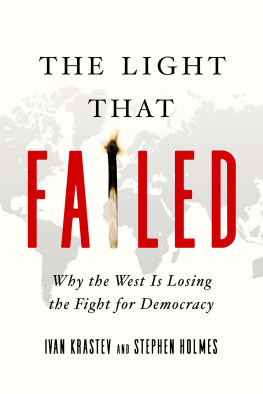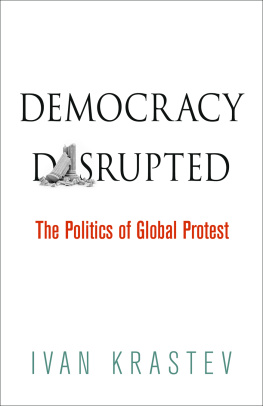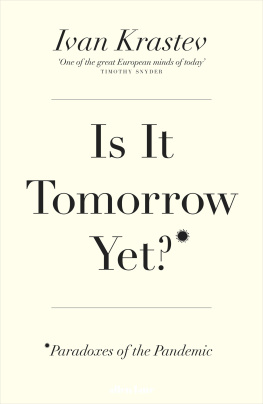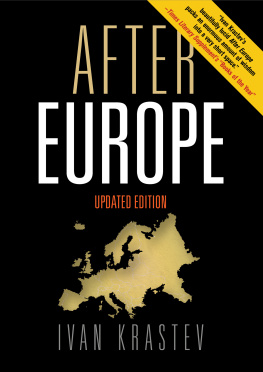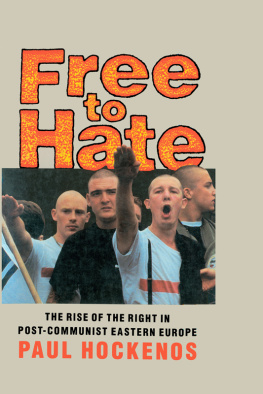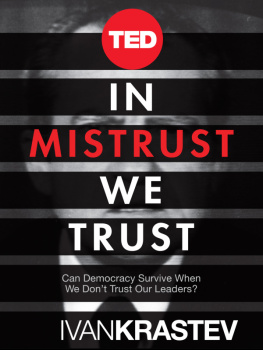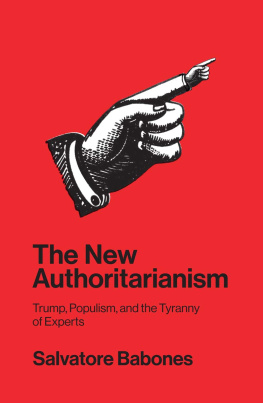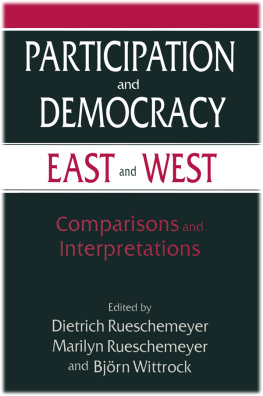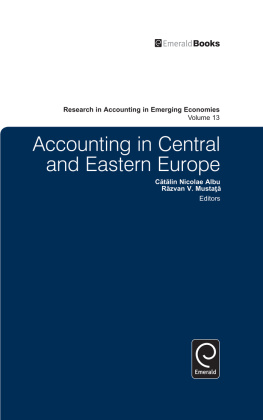Ivan Krastev and Stephen Holmes
THE LIGHT THAT FAILED
A Reckoning

PENGUIN BOOKS
UK | USA | Canada | Ireland | Australia
India | New Zealand | South Africa
Penguin Books is part of the Penguin Random House group of companies whose addresses can be found at global.penguinrandomhouse.com.

First published in Great Britain by Allen Lane 2019
Copyright Ivan Krastev and Stephen Holmes, 2019
The moral right of the authors has been asserted
Cover design by Richard Green
ISBN: 978-0-241-34571-9
This ebook is copyright material and must not be copied, reproduced, transferred, distributed, leased, licensed or publicly performed or used in any way except as specifically permitted in writing by the publishers, as allowed under the terms and conditions under which it was purchased or as strictly permitted by applicable copyright law. Any unauthorized distribution or use of this text may be a direct infringement of the authors and publishers rights and those responsible may be liable in law accordingly.
Imitation and its Discontents
We are all born originals why is it so many of us die copies?
Edward Young
The future was better yesterday. We used to believe that the year 1989 divided the past from the future almost as clearly as the Berlin wall divided the East from the West. That is not the way we think today. Most of us now have trouble imagining a future, even in the West, that remains securely democratic and liberal.
When the Cold War ended, hopes for liberal capitalist democracy spreading globally were high. The geopolitical stage seemed set for a performance not unlike George Bernard Shaws Pygmalion, an optimistic and didactic play in which a professor of phonetics, over a short period of time, succeeds in teaching a poor flower girl to speak like the Queen and feel at home in polite company.
Having prematurely celebrated the integration of the East into the West, interested observers eventually realized that the spectacle before them was not playing out as expected. It was as if, instead of watching a performance of Pygmalion, the world ended up with a theatrical adaptation of Mary Shelleys Frankenstein, a pessimistic and didactic novel about a man who decided to play God by assembling replicas of human body parts into a humanoid creature. The defective monster felt doomed to loneliness, invisibility and rejection. And envying the unattainable happiness of its creator, it turned violently against the latters friends and family, laying their world to waste, leaving only remorse and heartbreak as legacies of a misguided experiment in human self-duplication.
How liberalism ended up the victim of its heralded success in the Cold War is the story this book aims to tell. Superficially, the fault lay with a series of profoundly destabilizing political events: the 9/11 attack on the World Trade Center in New York, the second Iraq War, the 2008 financial crisis, Russias annexation of Crimea and intervention in Eastern Ukraine, the impotence of the West as Syria descended into a humanitarian nightmare, the 2015 migration crisis in Europe, the Brexit referendum, and the election of Donald Trump. Liberal democracys post-Cold War afterglow has also been dimmed by the Chinese economic miracle, orchestrated by a political leadership that is unapologetically neither liberal nor democratic. Attempts to salvage the good name of liberal democracy by contrasting it favourably with non-Western autocracy have been undercut by the feckless violation of liberal norms, as in the torture of prisoners, and the evident malfunctioning of democratic institutions inside the West itself. Tellingly, how democracies atrophy and perish has become the question that most preoccupies liberal scholars today.
The very ideal of an open society, too, has lost its once-fted lustre. The three decades following 1989 turned out to be an inter-mural period, a brief barricade-free interval between the dramatic breaching of the Berlin Wall, exciting utopian fantasies of a borderless world, and a global craze of wall-building, with cement and barbed-wire barriers embodying existential (if sometimes imaginary) fears.
Most Europeans and Americans today also believe that the lives of their children will be less prosperous and fulfilling than their own. A century after Yeats wrote them, these words are now the mantra of apprehensive defenders of liberal democracy worldwide: Things fall apart; the centre cannot hold; / Mere anarchy is loosed upon the world.
In his memoir The World as It Is, Ben Rhodes, Barack Obamas closest aide and personal friend, confides that, on the day Obama left the White House, the worry that haunted him most was: What if we were wrong? The uncertainty was not What went wrong? or Who acted wrongly? Nor was Hillary Clintons What happened? the most urgent mystery to solve. Obamas more troubling query was: What if we were wrong? That is, what if liberals had misinterpreted the nature of the post-Cold War period? What if we were wrong? is the right question and the one we have set out to answer in this book.
For the two of us, it is also an acutely personal question. The older of the two, the American, was born a year after the Cold War began and learned in high school that the just-erected Wall was an incarnation of intolerance and tyranny. The younger one, the Bulgarian, was born on the other side of the EastWest divide some four years after the Wall went up, and grew up believing that tearing down walls was a pathway to political liberty and individual freedom.
While our backgrounds are different, both of us lived for years in the shadow of the Wall and its dramatically televised demolition turned out to be the defining moment in our political and intellectual lives. First the Berlin Wall and then its absence have indelibly marked our political thinking. The illusion that the end of the Cold War was the beginning of an Age of Liberalism and Democracy was our illusion too.
This book represents our attempt to understand not only why we were once ready to embrace this illusion but also how to think about a world onto which a high tide of illiberal and anti-democratic anarchy has now been so ominously loosed.
THE SENSE OF AN ENDING
Three decades ago, in 1989, a US State Department official pithily captured the spirit of the time. Writing a few months before the Germans would joyfully dance on the sledge-hammered remains of the Berlin Wall, he proclaimed the Cold War effectively over. The comprehensive victory of liberalism over communism had been sealed by a decade of economic and political reforms initiated in China by Deng Xiaoping and in the Soviet Union by Mikhail Gorbachev. The elimination of the Marxist-Leninist alternative to liberal democracy, Francis Fukuyama argued, signalled the total exhaustion of viable systematic alternatives to Western liberalism. Having been crowned by Marxists as the culmination of History in the Hegelian sense, communism was suddenly demoted to history in the American sense of something of negligible significance. Western liberal democracy, under these circumstances, could be called the end point of mankinds ideological evolution. After the downfall of the fascist and communist dictatorships of this century, the only form of government that has survived intact to the end of the twentieth century has been liberal democracy. Because the basic principles of the liberal-democratic state were absolute and could not be improved upon, the sole task left to accomplish for liberal reformers was extending those principles spatially, such that the various provinces of human civilization were brought up to the level of its most advanced outposts. Fukuyama maintained that liberalism would eventually become victorious throughout the world. But his real point was that no ideologies which claimed to be more advanced than liberalism could hereafter arise.

